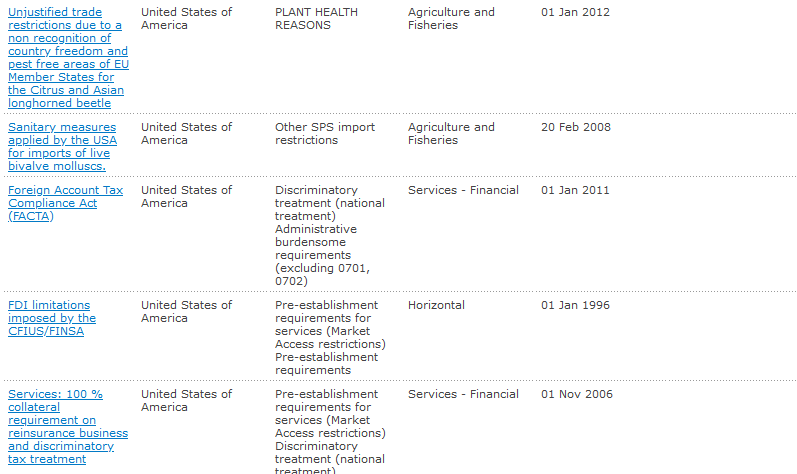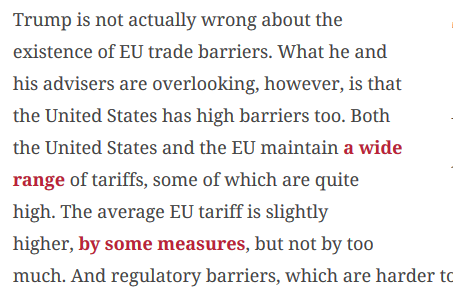A little Monday morning tale - how the US and EU have been engaged in a low level trade conflict for many years, and how the UK government is being urged to join the US side in *intensifying* this. And needless to say, why we shouldn& #39;t get involved... 1/
That US-EU trade conflict - for many years both sides have been complaining about the other. For example as well known the US believes the EU is unfairly blocking market access for their beef, chicken, pork etc among others - see https://ustr.gov/sites/default/files/2020_National_Trade_Estimate_Report.pdf">https://ustr.gov/sites/def... for this and more 2/
We hear less from the EU on grievances about accessing the US market, but there are plenty, some equally long lasting. Many are listed in their Market Access database, others relate to how US regulatory systems work (or don& #39;t, often) https://madb.europa.eu/madb//barriers_result.htm?isSps=false&countries=US">https://madb.europa.eu/madb//bar... 3/
Once upon a time we were going to try to solve this EU-US conflict through a trade agreement, TTIP. Talks ran for three years and failed to deliver agreement. Ultimately you& #39;d need something like this to resolve the differences - as recognised here... https://www.cato.org/publications/commentary/new-ttip-way-ease-eu-us-trade-conflict">https://www.cato.org/publicati... 4/
Anyway, who are the goodies and baddies in the US / EU trade conflict, so the UK can decide who to back? And here unfortunately we have a problem - because both do bad things, and even worse are likely to carry on doing so... 5/
The US won a case at the WTO on the EU& #39;s ban on beef treated with growth hormones. The EU carries on anyway, with compensation. Realistically, the EU is no more going to change food regulations to allow this than the US is to allow French cheeses... 6/ https://www.euractiv.com/section/trade-society/news/us-renews-fight-against-eu-ban-on-hormone-treated-beef/">https://www.euractiv.com/section/t...
Anyway the US-EU trade conflict is likely to keep bubbling away with the main impact being to stop the two properly cooperating on issues like mutual concerns over China at the WTO. A lose-lose if you like. At this point enter Brexit advocates and the UK government... 7/
For some the idea of a US-UK trade deal has always been mostly about attacking EU regulatory approaches in areas like food. Obviously this would fit to both the interests of those who want to undermine the EU, and US farmers. For example... 8/ https://www.sustainweb.org/news/nov18_davis_trade_us/">https://www.sustainweb.org/news/nov1...
Another example is Geographical Indications, rules on where some foods can come from, which have been a major EU-US flashpoint for years. Bizarrely these appeared in the report on Northern Ireland & #39;Alternative Arrangements& #39; last year with no relevance to that subject... 9/
As already discussed, the US is definitely not going to & #39;win& #39; a battle with the EU over trade restrictions. Or vice versa. Even worse, our consumer preferences in areas like food are probably closer to the EU than US. So should we really be joining in? 10/ https://twitter.com/ShankerASingham/status/1273592379006750726">https://twitter.com/ShankerAS...
There have been other suggestions of the UK going further than the US in launching our own trade war with the EU - because apparently the Euro renders competition with some countries structurally unfair. 11/ https://www.politeia.co.uk/how-to-level-the-eus-playing-field-trade-remedies-for-a-trade-deal-by-david-collins/">https://www.politeia.co.uk/how-to-le...
These US-EU disputes put the idea that to support a UK-US trade deal is to support & #39;free trade& #39; in perspective. A US farmer view of free trade perhaps. Shared by some major agriculture exporters. In an overall dispute, about food preferences, they can& #39;t win. Why join? 12/
Ultimately any world trade system has to take account of consumer preferences, but also prevent arbitrary discrimination. WTO rules are out of date, but with little prospect of update. We& #39;ll have to muddle through, as indeed is happening. 13/

 Read on Twitter
Read on Twitter





